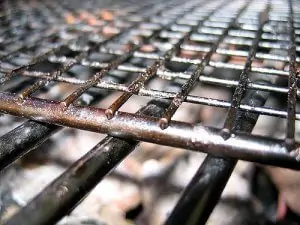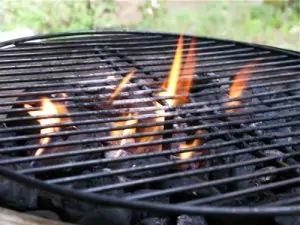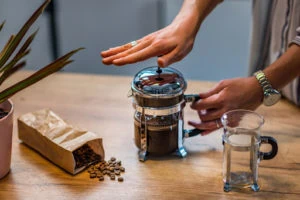
Cast iron has been used in cookware for thousands of years, spanning different civilizations. Its durability remains unmatched. Compared to many other modern forms of cookware, it remains relatively inexpensive. The health benefits of cast iron are singular—no other widely available cooking surface actively contributes a considerable amount of a necessary nutrient (iron, naturally) the way cast iron does. Recently, grill manufacturers have been utilizing cast iron to substitute steel and other less durable materials.
A high-maintenance affair
With the marriage of cast iron and grilling grates, a near-perfect solution to grilling woes was discovered. The superior heat transfer of cast iron allows for pinpoint accuracy in grilling everything from ribs to eggplant to pineapple. However, as anyone who has lived with people as uninformed as my former roommates knows, the maintenance issue is real. Moisture is the enemy, and moisture is virtually unavoidable for your outdoor grill.
Enter porcelain coating. This smooth material, which coats many cast iron grilling grates, does not diminish the excellent heat transfer of the interior iron, while providing a strong armor against the elements. With this innovation, most of the benefits of cast iron grilling are retained, while many of their drawbacks are greatly reduced (if not eliminated entirely).
Porcelain power
Although porcelain makes working with cast iron far easier by reducing the need to season or ‘cure’ the bare metal and making cleanups much simpler, it comes with its own set of drawbacks. The porcelain enamel is relatively delicate, meaning that more brittle and abrasive cleaning devices and chemicals will compromise the protective quality of the porcelain.
However, with a few simple precautions and the right tools for the job, you can enjoy years of flawless grilling with your porcelain coated cast iron grill grate.

Elbow grease or soapsuds?
When faced with the task of maintaining the quality of your porcelain coated cast iron grill grates, be sure to give your grates a delicate yet firm dry scrub as the grates heat up. Take it easy on the marinades and sauces, and be sure to run over the grates again after cooking.
Invariably, we are bound to get our grates a little greasy over time. This is natural, and all the prevention in the world (short of simply not using the grill) will not guarantee against the unsavory blemishes on our cherished grates. When it comes time to properly clean your porcelain-coated cast iron grate (and that time WILL come!), consider using one or several of the following options.
Use a baking soda solution to remove the grease
You can try using a solution of baking soda if your grates are extremely dirty. Combine 6 tablespoons of baking soda with 2 ounces of warm water and apply the paste to the iron grates. After 20 minutes, clean it off with bristle grill brush. Remove off the paste before cooking anything on the grill and clean the brush when you’re done. You can remove the grates overnight to allow the solution to soak. Wash off the solution and replace the grates and use the grill brush to clean them.
Try Arm & Hammer baking soda from Amazon to remove grease from your grill grates.
Use tin foil to clean the grates
If the grill brush is hard to get or is inaccessible, you can use tin foil to clean them. Fold the aluminum foil to make a giant ball enough to fit in your fingers. Then run it over the grates to eliminate any debris. When they cool, use the tin foil to clean them to avoid burning your finger. The tin foil should be enough for creating a buffer between fingers and the grates.
Reynolds Wrap is a great tin foil to help scrub the grill grates!
Konestar 3-in-1 Grill Brush
The Konestar 3-in-1 Grill Brush is a solid choice. A comfortably angled tri-bristle brush allows for effortless cleaning and removal of skuzzy burnt residues, which can offset the robust flavor of your favorite grilled foods. The 18 inch handle will keep your hands out of the danger zone of extreme grill heat, guaranteeing safe cleaning. The stainless steel wire will not damage even the most sensitive porcelain coatings.
The 3-in-1 grill brush lets you scrub all parts of the grates faster than the old traditional brushes. Its has spiraled brushes and angled head that allow simultaneous cleaning of the top, bottom, and sides of the grill. Also, it has a long handle that keeps you safe from heat generated from the grill. Its stainless steel material and the standard plastic handle makes the brush more sturdy and durable.
Sage Owl Universal Barbeque Grill Scraper
The Sage Owl Universal Barbeque Grill Scraper offers a fascinating innovation – complete grill grate cleaning without the risk of bristles lost deep within your steaks and fillets. This brilliant design offers the reach of the stainless steel brushes, without the risk of lost bristles, which can add an unwelcome (and potentially dangerous) spice to your food.
The bronze head has grooves of several sizes, allowing a smooth, even scraping of the most charred and burnt grates. The soft nature of the bronze is not as dense as even the most delicate porcelain coating, meaning you will not risk chipping the precious porcelain. Its elegant wooden handle will make it fit right in to your classiest collection of grilling gadgets and gizmos.
This grill scarper offers effortless cleaning as it eliminates any char and grease from your BBQ. It has a flexible shaft made of aluminum metal making it strong. Also, the wire bristles that may tear during cleaning are harmless when accidentally ingested with food. Better yet, the martin barbeque grill scraper comes with a lifetime warranty.

Weber Grill Cleaner Spray
weber, the manufacturers of some of the world’s most respected grills, offers their Grill Cleaner Spray as the ultimate grill-cleaning product. In conjunction with one of the aforementioned pieces of hardware, the resultant combination will provide a formidable cleaning combination suited to tackle even the toughest grill grime. This non-toxic, citrus-derived spray cleaner will eliminate the need for extra fuel use for cleaning porcelain grill grates with heat, as it can be used on a cool grill grate.
The Weber grill cleaner is ideal on any cooking grids. You can use it on both cast iron and stainless steel. It is non-toxic, and its USDA certified and approved that it cannot cause skin inflammation and irritation.
Frequently Asked Questions
Why are cast iron grates coated with porcelain?
The cast iron grates are coated with porcelain because pure cast iron is corrosive. The coating prevents the iron grates from rusting that would corrode the metal making it ineffective. Also, a coated porcelain cast iron is easy to clean, and you don’t need to season it.
Does porcelain grill rust?
The porcelain grills are rust-resistant and hold heat well, but it’s always essential to keep them clean at all time. The scrapes and chips expose the underneath metal allowing water to seep in, which can cause it to rust. Be cautious not to scrape the metal when cooking.
Is it essential to season porcelain enameled cast iron grates?
The new iron grates in the market have a porcelain enamel coating. Thus they don’t require seasoning. Preparing the iron grates requires heating the grill on a burner for approximately 10 to 15 minutes and cleaning them by brushing. Adjust your burner correctly for the desired cooking temperature, and your grill is ready for use.
Can I put my grates in the dishwasher for a better cleaning?
The porcelain enamel grill should not put in the dishwasher. The dishwashers have soap tablets that are extremely abrasive. Cleaning your grates in the dishwasher will have them well cleaned, but it will reduce its lifespan. I would advise you to give your burner at least ten minutes after every cookout to char the reaming food residue. Soak them in soapy water after they cool and clean them with a non-metallic scourer. Repeat the soak if you don’t get the dirt off.
Why are cast iron grates coated with porcelain? Can I use a grill brush to clean Traeger grates?
Cast iron grates are coated with porcelain to prevent rusting and to make it easy for cleaning. However, in some low quality and cheap grills, porcelain is used to cover up some poorly made cast iron metal. Uncoated iron grates are prone to rust and require frequent oiling thus porcelain coating would prevent that. Lately, brass bristles are rarely in the market since the brush manufacturers prefer stainless steel bristles which are stiffer than the brass bristles. If you have grates with high accumulation of gunk, you should wet the brush before scrubbing to give a steam cleaning effect. I would advise you to avoid using the scraper of the grill brush on porcelain coated grates. Otherwise, you will damage the porcelain coating.
Porcelain for the win
Now that you’ve decided on a porcelain coated cast iron grill grate, you can understand what it takes to clean these wonderful grilling devices, and ensure many years of supreme grilling with the help of some simple grill grate cleaning products.
Additional Resources:
Image credit via Flickr Creative Commons: Michelle G. and Leonid G.










David learned to cook at an early age after his mother told him that he couldn't live on pizza forever, Dave uses his modest kitchen skills to recreate sorely-missed recipes from home and to occasionally make new favorite ones from places he is visiting.